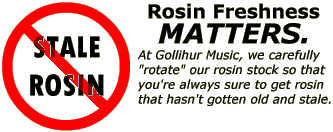ROSIN: Choices and use
 Rosin is a necessity for bowing; an unrosined bow will glide across the strings without being able to grab the string and begin its movement. Only experience can tell you which rosin is the best for you, your bow, your bass, strings, and style of play... and that can change over time.
Rosin is a necessity for bowing; an unrosined bow will glide across the strings without being able to grab the string and begin its movement. Only experience can tell you which rosin is the best for you, your bow, your bass, strings, and style of play... and that can change over time.You'll see various types of rosin available for different tastes and environments. Those termed Winter, Soft, etc., are generally stickier in composition, to compensate for the typically dryer air. A more dry and powdery rosin is applicable to humid weather, where you'll find Summer, Hard, or a similar term applied. Medium, All-Weather, and those available in only one composition are generally aimed at environments with a more moderate humidity. (These comments are based on my New Jersey climate, yours may vary, so use this information in the context of your own environment.)
Some other points about bass rosin:
- Keep your rosin in an airtight bag or other container if it is not already in one. It will extend its life and keep it from running all over the place and ruining your case if it accidentally melts. (Keep away from heat!)
- Rosin for other stringed instruments are of a different composition. For example, violin rosin is usually much harder, as less stickiness is necessary to move the much smaller diameter string.
- To prepare your rosin for use, use a sharp knife to cut a vertical line in the metal or cardboard surround (if applicable) about a ¼” or less. Then peel it around to expose a small top section. Apply rosin using all edges, don’t wear a groove. Cut again as needed.
- Smoothly and with very little pressure, glide your bow, frog to tip, at an angle to the edge. Only three or four strokes will prepare a new bow; don’t overapply!
- Season your bow with rosin the same way you should salt your food -- taste it before you reach for the salt or rosin!! Bow a few notes first to determine if you actually need some, and how much, before you apply any.
- If your bowed sound is unacceptable, don't blame the rosin immediately. Many factors affect the tone,hair tension, technique, some strings are not that bow-friendly, bow hair can be old and require replacement, etc.
